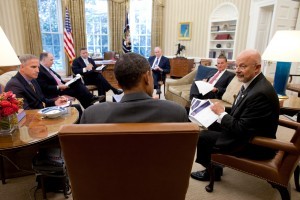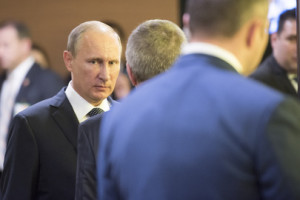Clapper’s Unhinged Russia-Bashing
Exclusive: Russia-gate’s credibility rests heavily on ex-Director of National Intelligence Clapper who oversaw a “trust us” report, but a recent speech shows Clapper to be unhinged about Russia, as David Marks describes.
Whatever the ultimate truth about the murky Russia-gate affair, it appears that it is Donald Trump’s willingness to consider friendship and cooperation with the Russians that is driving this emotional debate.

Director of National Intelligence James Clapper (right) talks with President Barack Obama in the Oval Office, with John Brennan and other national security aides present. (Photo credit: Office of Director of National Intelligence)
For some of the older U.S. intelligence and military officers, there appears to be a residual distrust and fear of Moscow, a hangover from the Cold War now transferred, perhaps almost subliminally, into the New Cold War and a sense that Russia is America’s eternal enemy.
James Clapper, President Obama’s last Director of National Intelligence, is a fascinating example of how this antagonism toward Russia never seems to change, as he revealed in a June 7 speech to the Australian National Press Club.
“The Russians are not our friends; they, (Putin specifically) are avowedly opposed to our democracy and values, and see us as the cause of all their frustrations,” Clapper declared.
In reaching that harsh judgment, Clapper ignored the U.S. government’s own role in the mounting tensions – expanding NATO to Russia’s borders, renouncing the Anti-Ballistic Missile Treaty, and locating new missile bases in Eastern Europe. Instead, Clapper blamed the renewed arms race and resulting tensions on the Russians:
“The Russians are embarked on a very aggressive and disturbing program to modernize their strategic forces — notably their submarine and land-based nuclear forces. They have also made big investments in their counter-space capabilities. They do all this — despite their economic challenges — with only one adversary in mind: the United States. And, just for good measure, they are also in active violation of the Intermediate-Range Nuclear Forces treaty.”
That Clapper would offer such a one-sided account of the reasons behind the worsening antagonisms and the emerging arms race – leaving out the fact that the United States, despite its own budgetary and economic problems, spends about ten times more on its military than Russia does – suggests that he is not an objective witness on anything regarding Russia.
A Shrill Voice
Clapper’s shrill voice confirms his cold-warrior perspective, caught in the past but applying his thinking to the present, still believing that he has a special understanding of America’s interests and is protecting them. Clearly, the Russians have been at the center of Clapper’s frustrations for many years and Russia-gate just gives him the opportunity to rekindle anti-Moscow hysteria.
Clapper is repeating with new gusto what he has sold to recent presidents, Republicans and Democrats, for decades. His entire attack on Trump beats the drum of Russian deviousness. Yet, Clapper ignores the context of the Russians actions.

Time magazine cover recounting how the U.S. enabled Boris Yeltsin’s reelection as Russian president in 1996.
Way ahead of the Russians, the U.S. intelligence community mastered computer hacking and mounted the first known software attack on a country’s strategic infrastructure by – along with Israel – unleashing the Stuxnet cyber-attack against Iranian centrifuges. U.S. intelligence also has a long record of subverting elections and toppling elected leaders, both before and since the computer age.
But Clapper only sees evil in Russia, even during the 1990s when the U.S. government advisers and American political operatives were propping up President Boris Yeltsin amid the rapacious privatizing of Russia’s industries and resources, which made Russian oligarchs and their U.S. advisers very rich.
Clapper said, “Interestingly, every one of the non-acting Prime Ministers of Russia since 1992 has come from one of two domains: the oil and gas sector, or the security services. To put this in perspective, and as I have pointed out to U.S. audiences, suppose the last ten presidents of the U.S. were either CIA officers, or the Chairman of Exxon-Mobil. I think this gives you some insight into the dominant mind-set of the Russian government.”
With such remarks, Clapper acts as if he doesn’t know much about recent U.S. government staffing, which has been dominated by people with backgrounds in the oil industry, leading Wall Street banks, and the intelligence community. Indeed, the man who brought Clapper from Air Force intelligence into the White House was President George H.W. Bush, former director of the CIA and an oil company executive.
Bush’s son, George W., also came from the oil industry, as did his Vice President Dick Cheney. Meanwhile, both Republican and Democratic administrations have filled senior economic policy positions from the ranks of Goldman Sachs and other Wall Street investment banks. And the U.S. intelligence community has wielded broad power over the few recent U.S. presidents, such as Barack Obama, who came into the White House with more limited government and private-sector experience.
Clapper, having been a senior executive for Booz Allen Hamilton, knows full well that giant intelligence contractors have a powerful influence in how they serve U.S. interests with an eye to profiteering from conflict. And along with Clapper, other White House advisers drift between intelligence contractors and government.
It’s also true that a U.S. president doesn’t need to have previous employment within the oil sector to do its bidding. Considering the influence of the millions spent on campaign donations and lobbying by the industry, the U.S. government is easily wed to oil and gas – as well as to the military and intelligence complex – at least as much as the Russian government. Indeed, the current Secretary of State, Rex Tillerson, was the Chairman and CEO of Exxon Mobil.
Classic Projection
Clapper’s perception of the Russians as evil for allegedly practicing the same sins as the U.S. government exemplifies classic projection of the highest order.

Russian President Vladimir Putin, following his address to the UN General Assembly on Sept. 28, 2015. (UN Photo)
In case after case, Clapper justifies painting darkness onto the Russians with half the data, while ignoring the information that cancels out his perspective. Perhaps he is representative of many in Washington who have lost their rationality and morality in defense of the greatness of the United States. His ethics become situational.
As Director of National Intelligence, Clapper lied to Congress in 2013 about the National Security Agency’s massive gathering of private data from Americans. Clapper’s deception gave the final push to Edward Snowden who revealed the truth about NSA surveillance.
Subsequently, Clapper led the charge against Snowden, while excusing his own false congressional testimony by saying, “I responded in what I thought was the most truthful, or least untruthful, manner.”
Despite this history, the U.S. mainstream media has treated Clapper as a great truth-teller as he adds ever more fuel to the Russia-gate fires. From his Australian speech, most news outlets highlighted his best news-bite, when he declared: “Watergate pales, really, in my view compared to what we’re confronting now.”
Like other powerful government officials, Clapper may think it is his duty to a higher cause that allows him to defy the truth and transcend the law, a classic symptom of the super-patriot who thinks he knows best what’s good for America, a dangerous creature that the U.S. government seems to produce in quantity.
In that sense, Clapper has played a central role in Russia-gate. He was the official who oversaw the key Jan. 6 report on alleged Russian interference in the 2016 election. After promising much public evidence, he released a report that amounted to “trust us.”
Clapper has since been a star congressional witness pushing Russia-gate and his confidence in Putin’s guilt. But Clapper did acknowledgethat the Jan. 6 report – besides containing no actual evidence – was prepared by “handpicked” analysts from the CIA, NSA and FBI, not from a consensus of all 17 U.S. intelligence agencies as had been widely reported.
So, as we listen to the debate on Russia-gate, Clapper and his fellow national-security-state representatives are revealing not just their political perspectives but deeply disturbed minds. Those who angrily criticize the Russians are completely blind to their own participation in a similar destructive process. They perceive themselves as the cure when they are a primary cause of the illness they denounce.
In 1956, in the Undiscovered Self, the eminent psychiatrist Carl Jung wrote about the state of the human mind and how it affected the political world: “And just as the typical neurotic is unconscious of his shadow side, so the normal individual, like the neurotic, sees his shadow in his neighbor or in the man beyond the great divide. It has even become a political and social duty to apostrophize the capitalism of one and the communism of the other as the very devil, so to fascinate the outward eye and prevent it from looking at the individual life within. …
“We are again living in an age filled with apocalyptic images of universal destruction. What is the significance of that split, symbolized by the Iron Curtain, which divides humanity into two halves? What will become of our civilization and man himself, if the hydrogen bombs begin to go off, or if the spiritual and moral darkness of State absolutism should spread?”
Jung’s words still ring with foreboding truth.
David Marks is a veteran documentary filmmaker and investigative reporter. His work includes films for the BBC and PBS, including Nazi Gold, on the role of Switzerland in WWII and biographies of Jimi Hendrix and Frank Sinatra.



Geen opmerkingen:
Een reactie posten